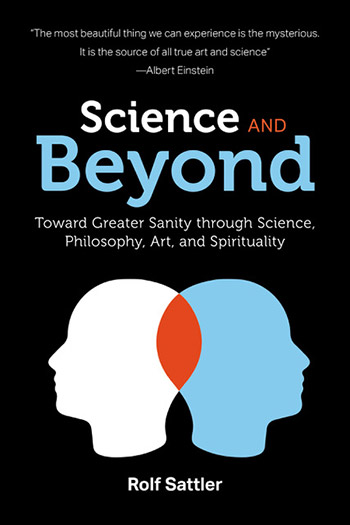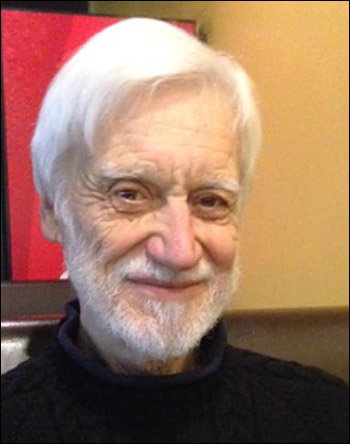

















|

Rolf Sattler Discusses
Science and Beyond
By Alla Drokina
Rolf Sattler, author and Professor Emeritus of McGill University in Montreal, is no stranger to devoting his life to the sciences: he has published nearly a hundred scientific research papers and several books.
In his new book, Science and Beyond, he is passionate about elucidating the limitations and misconceptions of science. He contends that science, although important, isn’t the only portal to truth.
In order to attain a well-rounded and balanced life and perspective, Sattler argues that philosophy, art, and spirituality mustn’t be disregarded in lieu of science alone.
Below, we speak about the contents of his book, aspects of an impoverished society, the importance of spirituality, and, yes, the power of laughter.

I would love to talk to you about the merging of science, philosophy, art, and spirituality in this book, Science and Beyond. Could you touch on that please?
Well, it's actually less a merging than a going beyond. What I am pointing out in this book is very much the limitations of science, which are often not recognized because many people think that science will eventually solve all our problems and science gives us the truth with a capital T, and so we don't need anything else.
In that case, philosophy and art and spirituality are just for entertainment, but don’t have much to do with the truth because we will get the truth from science. That’s really what I'm after in this book.
I have eleven chapters in the book. And in each chapter, I point out one fundamental misconception about science. These misconceptions are widespread and have grave and sometimes disastrous consequences.
Elucidating these misconceptions was one of the main reasons why I wrote the book because I find there is very little awareness of these misconceptions and of their grave and disastrous consequences that we could also see during this pandemic. And these consequences, they really are detrimental to our health, sanity, and well-being. May I just mention a few of them?
Yes, please. I was about to ask you that, actually. We're on the same page.
That's great. One widespread misconception is that we endow genes and viruses with too much power. We give them power that they don't have, because a gene or a virus, by itself, cannot do anything. What they do depends on the context in which they operate. And the context includes the physical condition of the person who has the gene or is infected by the virus.
It involves nutrition, lifestyle, and all these things. It also includes the feelings and emotions, thoughts, and the spiritual life of the person. All of these aspects may play a role in the expression of a gene or a virus.
The reason why I'm so much concerned about this is because people, including many scientists, think that if we just understand the gene or the virus, then we understand everything. But, as I just said, we also have to include the whole person and even the environment of the person. For that reason, I think it is very important to further investigate the influence of that context. And, I feel that's very often ignored.
As a result, we become victims of this idea that the gene or the virus is all powerful, and we are powerless. You may know, there is a new branch of medicine called epigenetic medicine that investigates how the person in his or her environment influences the expression of the gene.
We often hear there is a gene for this and for that— for example, a breast cancer gene, and so on. But some people who have that gene, they may get breast cancer, or they may not. Whether they get it or not doesn't always depend on the gene, again it depends on the context of the person, all these dimensions that I just mentioned. The same applies to viruses.
So, what I'm suggesting in my book is that we should also develop an epiviral medicine that investigates how everything around and above the virus influences the action of the virus. I think that would be important and that could be very relevant to preventing infection, and then sickness and also mortality.

In this day and age, do you think that there's a lot more emphasis on glorifying science rather than philosophy, art, and spirituality?
Yeah, I think so. For example, when you think of how much money is poured into science, I mean, it's millions and billions. And, how much is given to the arts, I think very little, and also to spirituality, very little.
In Kingston, where I live, we have a symphony orchestra. They have to do fundraising to survive. In Europe, it's a little bit better in this respect, but I think there is much neglect of the arts and spirituality.
There's definitely an interest in that, but the widespread idea is that science provides the truth, and only science provides the truth, and that art is more for entertainment. But in my book I am pointing out why science cannot lead us to the truth with a capital T. I think science can provide aspects of the truth, but not the whole truth. There are various reasons for that.
One main reason is that science uses language and mathematics, a form of language. And everything that is expressed through language is incomplete, is one-sided, is not the whole truth.
Let's say, you say something like, John is bad. He may be bad, and this may be an aspect of his personality, but he is a lot more than just bad.
One important philosopher, Alfred Korzybski, to whom I also dedicated my book, pointed out that when we say something like, ‘John is bad,’ we should add etc. We should say John is bad, etc. Because through language we can capture only one aspect. And, there's so much left out.
For many people, this is obvious, but I think maybe it is not so obvious that science depends on language and mathematics, and therefore, science inherently is limited. It cannot tell us the whole truth, that which is really there, but only some aspects of it.
If that is understood, then of course, immediately we create a space for art and spirituality, because then we can see that art can express another aspect of truth. And spiritual experience can also express other aspects of truth.
You know from personal experience that if you are totally immersed, let's say, in a piece of music, that gives something you cannot get through language and science. I emphasize this so much, because this idea that science can give us the truth, is so widespread. And, that is unfortunate, because if we believe that, then we are not looking for truth elsewhere.
As a result, we lead an impoverished life, and also society becomes impoverished.
What are the manifestations of an impoverished society?
Well, in our society the emphasis is a lot on the thinking mind, on rationality, on science, and far less on intuition, feeling, and these aspects that relate to our emotions and spiritual experience.
This creates an imbalance, which then leads to an impoverished life and an impoverished society.
What kind of spirituality do you touch on in your book?
That's a good question. I emphasize non-duality, where you can see and experience spirit and matter as being one, not separate. Very often we imply a separation between matter and spirit or between the body and spirit.
To me, the deepest experience of spirituality is when we can see all as one and go beyond division and fragmentation. I give examples from different traditions like Buddhism and Taoism, and one could find examples from Christianity or Sufism.
I have a lot of quotes in my book, especially quotes from spiritual masters. And another thing I have in my book is jokes, because to me, jokes are very important. They make us laugh and relax and feel good.
Someone said, ‘laughter is a shortcut to Nirvana.’ Because, when you really laugh, you go beyond your problems that you've created through your thinking mind and even emotions.
For more information, please visit www.RolfSattler.com
Home |
Actors/Models |
Art |
Books |
Dining
Film & Video |
Food & Wine |
Health & Fitness
MediaWatch |
Money and Business |
Music |
Profiles
Professional Services |
Sports |
Style & Fashion
Technology |
Theatre |
Travel & Leisure
Copyright 1995 - 2024 inmag.com
inmag.com (on line) and in Magazine (in print)
are published by in! communications, Inc.
www.inmag.com
|


Advertiser Info
Subscription Form
Contact Us
|



